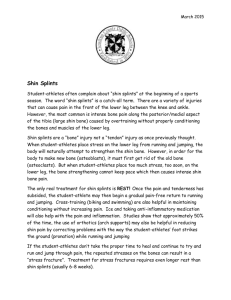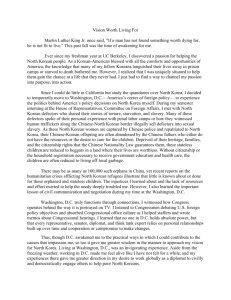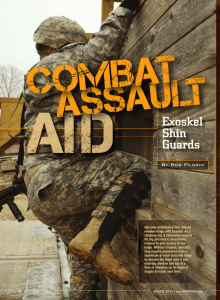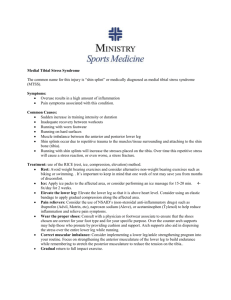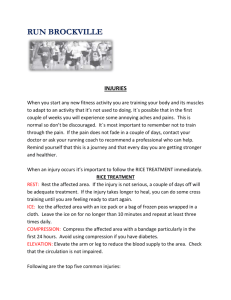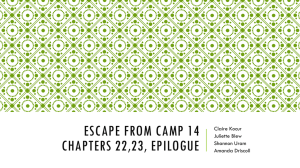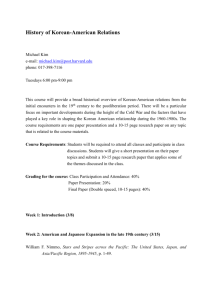Chapters 19-20 22
advertisement
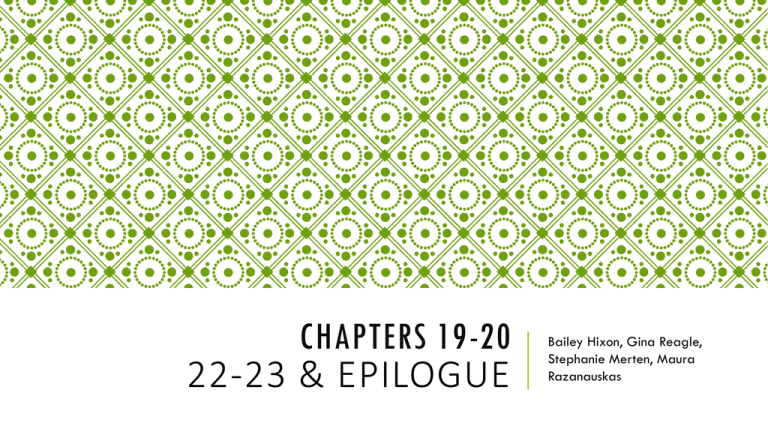
CHAPTERS 19-20 22-23 & EPILOGUE Bailey Hixon, Gina Reagle, Stephanie Merten, Maura Razanauskas CHAPTER 19: CHINA SUMMARY Shin finally makes his way into China with little knowledge on how he will survive there, especially with the Chinese border patrol watching for North Korean defectors. Shin's hope was that ethnic Koreans would offer him food and shelter, but, in the Chinese border towns, this was not the case due to the residence being warned not to help North Koreans. However, by winding into the mountains Shin was able to find a pig farmer who spoke Korean and offered him a job paying 60 cents a day. Shin was treated well, healed his leg burns, and worked at this farm for about a month, until the farmer told Shin he could no longer work at his farm and got Shin another job at a ranch further into the mountains. CHAPTER 19: CHINA SUMMARY In three most north-eastern provinces of China, there are about 2 million ethnic Koreans. This allows defectors, such as Shin, to escape and be absorbed into China somewhat easily, especially in Jilin, where Shin escaped to, with the highest amount of Koreans. Ethnic Koreans have impacted Chinese culture since the 1860s when famine struck North Korea. Their influence is majorly coming from the South Korean entertainment that is smuggle into China and then into North Korea, where it has a large following in Pyongyang. China and North Korea made secret agreements to ensure that the amount of defectors from North Korea never gets out of control, and that China will return defectors to North Korea. This goes against international laws Although Chinese people don't want defectors for political reasons, it is hard to pass up cheap labor, like Shin. CHAPTER 19: CHINA DICTION The words are more concrete than abstract in Chapter 19. This chapter talks a lot about Shin's travels, so a lot of the words are concrete and related to that. This is because Shin has just recently escaped from Camp 14 and really isn't aware of the idea of abstract words or what they are, as most relate to emotion, which was discouraged in his camp in North Korea. Examples: riverbank, woods, hill, houses, forest, town, border, etc. There weren't any unusual words or usages in Chapter 19. This is because the author wants the reader to focus on the actual story and not have to be concerned with figuring out odd words or usages. There are no first or second person pronouns. It is written in third person, and reads kind of like a newspaper article because the author was a journalist for the Washington Post. CHAPTER 19: CHINA DICTION Throughout this chapter, Harden uses strong words to get his point across and for extra emphasis. Strong descriptive adjectives. Pg. 150: fast cars, opulent houses, surging confidence, upper-crust ... demolished, poor, repressed, unhappy The contrast of these adjectives show a more significant difference of what life was like in South Korea as compared to what North Korea wanted their people to believe. He uses verbs to help develop the scene and character. Pg. 147: pleaded, warned, digging, scraped, begged These verbs help to show how hopeless Shin was and that he was desperate for help because he was barely making it on his own. These words help to show his desperation. CHAPTER 19: CHINA SYNTAX Chapter 19 has a mix of short and long sentences, however the sentence length is used to tell different parts of the story. Short sentences are often used to tell information about Shin's escape and survival. Ex: "The soldiers Shin saw were gazing up at the sky. He guessed they were counting stars. In any case, Shin's presence did not seem to interest them." Long sentences are often used when describing the political events that are key to understanding Shin's escape. Ex: "Since 2002, when hundreds of North Korean asylum seekers embarrassed China by rushing into foreign embassies, soldiers had begun rounding up illegal border crossers and forcibly repatriating tens of thousands of them." When short sentences are used to tell Shin's story it simply displays the facts and doesn't force the readers to have a certain emotions. Also, the short sentences ensure that there is equal weight and importance stressed in each step of Shin's survival. CHAPTER 19: CHINA SYNTAX The longer sentences used to describe more of the world events are used to express as much detail as possible, so that the reader can fully understand why Shin has to be careful around the Chinese police and the importance of all the ethnic Koreans in China to defectors. These elements have to be explained in full detail using long sentences for the reader to understand the story. There are also many prepositional phrases used in this chapter. This is most likely due to the importance of location to Shin as he is escaping North Korea and working towards South Korea through China. Ex: "In the near distance", "beyond the fields", "where he walked", "where he slept", "where they sell", etc. CHAPTER 19: CHINA CONNECTOR This chapter illustrates Shin's time in China and compares it to statistics and facts of other North Korean defectors. The author is enabling the reader to realize that Shin moved through China with relative ease as he avoided Chinese border guards and police . This is combined with an economic timeline informing the reader on the flow of people over a period of time allowing for further understanding of agreements between China and North Korea. CHAPTER 20: ASYLUM SUMMARY Tending cattle, Shin stayed at the ranch for 10 months, where he was able to heal, earn six hundred yuan ($72.00), learn some Chinese, and listen to the radio. Many radio stations were funded by the U.S, South Korea, and human activist groups to cover stories of what was really happening in North Korea. However, Shin had difficulties trying to understand the broadcast due to his lack of knowledge of the world and the Kim dynasty. After becoming very lonely on the ranch, Shin decided to leave and head south in search for a church that might help him and a job. Shin found traveling in China easy compared to North Korea. Many people were used to North Korean defectors. In Chengdu (Southwest China), Shin started to look for work and churches that might help him, but he found no work and the churches only gave him a little cash. CHAPTER 20: ASYLUM SUMMARY Shin returned to Beijing and focuses his job search to Korean restaurants. Then he traveled to Tianjin, Jinan, and finally in Hangzhou Shin was offered a job. However, Shin quit 10 days later and headed for Shanghai. At a Korean restaurant in Shanghai Shin met a South Korean journalist who was able to sneak Shin into the South Korean Consulate, heavily guarded by Chinese officers looking for defectors. Finally Shin was under the South Korean governments protection. He stayed at the consulate for six months, where he was able to shower daily, wear clean clothes, and rest. Then Shin was flown to Seoul where the South Korean National Intelligence Service interrogated him for a whole month to learn his life story. CHAPTER 20: ASYLUM DICTION Again, most of the words in Chapter 20 are more concrete than abstract. Ex: radio, machine, stations, news, cattle ranch, mountains Most of the words are not used in a different way or hard to understand. However, one uncommon word, a PC bang, was on page 157. A PC bang is a type of social gaming center where people can meet up to play games or use the internet. They are popular in Korea, and are similar to the idea of an arcade. This chapter also does not use first or second pronouns and sticks with third person. CHAPTER 20: ASYLUM DICTION Several significant verbs and verbal phrases to add to the feeling of unease as Shin is helped by a journalist. Pg. 159: growing unease turned to panic, danger, grabbed, shake him off and run, milling, fearing deportation, dared, heavily guarded, apprehend These words and their connotations add to the feeling of panic and anxiety of Shin and help the reader better understand his mental state. Harden uses adjectives and adjective phrases to help set the scene and emphasize Shin's frustrations. Pg. 158: tried again, again, petty, still, again, hectic, no work The author uses again 3 times and still once in a matter of a paragraph to show frustration and how Shin is still unable to find asylum after several attempts. CHAPTER 20: ASYLUM SYNTAX Again in this chapter the shorter sentences are used to specifically tell what Shin is doing in the story and the longer sentences are used to tell background information. However, shorter sentences are a little longer than those in the previous chapter. Short Sentence Ex: "He knew little about the Kim family and even less about how it was viewed around the world." Long Sentence Ex: "The broadcasts were targeted at educated North Koreans, who had grown up with state media that venerates the godlike powers and wisdom of the Kim family dynasty and also warns that Americans, South Koreans, and Japanese are scheming to take over the entire Korean Peninsula." The short sentences seem as though they reflect Shin's life at this point in the story because with him listening to the radio he is gaining knowledge but not understanding all the details, so there are less details describing his life, making the sentences shorter. CHAPTER 20: ASYLUM SYNTAX Also, the short sentences are used most likely to make the story more objective, especially since the book was written by a Washington Post journalist. This keeps the book strictly factual when describing the key events of Shin's life. The longer sentences reflect the world that Shin doesn't yet understand, which is much more detailed and complicated than he knows at this point in the story. That is why when the author is trying to explain what is happening in the world, longer sentences are used because more detail is needed than Shin's story can give. CHAPTER 20: ASYLUM CONNECTOR In this chapter the reader is given a look into the knowledge that North Koreans have of the outside world. The knowledge of their illegal radios and movies is vital to the reader realizing that there are cracks in the government's security policy. The easily bribed Korean police will turn a blind eye in exchange for food. Shin also continues his journey through China enabling the reader to realize how many different jobs he tried to obtain and how his escape in China differs from his escape in North Korea. His luck in meeting a South Korean journalist and being able to be flown safely out of China even though the South Korean Consulate was heavily guarded shows where China's help to North Korean defectors ends. CHAPTER 22: SOUTH KOREANS ARE NOT SO INTERESTED SUMMARY Shin was still struggling in his financial and social life in Seoul , and his memoir was not selling many copies. Essentially, Shin was completely broke! Shin's memoir's lack of success showed how little South Korea was interested in the North. South Korea's main concern was making money than helping North Koreans escape from the grips of the Kim dynasty. Even after attacks, that have amounted to killing hundreds of South Koreans, South Korean people were never provoked, by the North, to the point of war. Although many South Koreans want unification, people believe the cost would be too high. Shin and other North Korean defectors found it very difficult to fit into society in South Korea. The numbers support their feelings too with defectors having a four times higher unemployment rate and two and a half times higher suicide rate than South Koreans. CHAPTER 22: SOUTH KOREANS ARE NOT SO INTERESTED SUMMARY South Koreans also have a hard time in their society. Although their hard work gives the country one of the best economies in the world, it also creates a highly competitive and stressful environment. This has led to a rising and very high suicide rate. Another added stress to South Korea is how it deals with the North. In 2008 President Lee cut almost all aid and sought agreements on nuclear disarmament and human rights, which lead to more tension between the North and South. Before 2008, South Korea gave lots of aid and payed little attention to human rights issues. Shin wanted to help raise awareness about North Korean labor camps, and so he decided to leave Seoul and go to the U.S to work for LiNK, Liberty in North Korea, as a human rights activist. CHAPTER 22: SOUTH KOREANS ARE NOT SO INTERESTED DICTION Chapter 22 uses a noticeable amount of abstract words instead of concrete. A lot of these words have to do with Shin and his feelings or also the feelings of South Korea as a whole. The shift from concrete to more abstract words could be showing that Shin is starting to have feelings and understand feelings, even if they aren't all good. moved, not happy, socialize, interested, indifference, influential, vengeance, peace Again, the words and usages are generally straight-forward. One word that could be unfamiliar is used on page 175 and it is "schism." It means a split or division caused by differing opinions. It was used in reference to South Korea's public's opinion on how to manage living next to North Korea. This chapter is also written in third person. There are some quotes directly from Shin that use I. These are probably used to establish credibility because they are coming directly from the source of the story. CHAPTER 22: SOUTH KOREANS ARE NOT SO INTERESTED DICTION Some of the verbs used when describing South Korea's stance with North Korea are noticeable and add to the meaning of the passage and add extra emphasis. Pg. 176: political winds are blowing, swing between, stiffened, cutting nearly all aid, approved massive shipments, agreed to generous economic deals The first words show that there was no distinct policy regarding North Korea and it changed often and easily. The other words show the difference in plans and emphasize the opposite ideas. This shows that North Koreans had trouble getting help even from their neighbors who knew what went on. There are several adjectives that are used to describe South Koreans and their view of North Koreans. The adjectives used show a stark contrast Pg. 174: ill-educated, ill-spoken, badly dressed bumpkins ... success-obsessed, status-conscious, educationcrazed Shows South Koreans thought badly of North Koreans and were more concerned with themselves. This adds to the overall fact that they weren't really willing to help the North Koreans because they were building a new life for themselves. CHAPTER 22: SOUTH KOREANS ARE NOT SO INTERESTED SYNTAX In this chapter, many of the sentences that are used to describe Shin and his life in South Korea are mostly short and very straightforward. The author uses these short sentences to parallel to Shin's feelings in his new country. At this point he is still unemotional and the short sentences shows this feeling. Ex. "That changed when he turned twenty-six in South Korea." "Nor was his social life in great shape." "Shin said he made no money from the book." But, when the author is describing the historical and political aspect of the relationship between the South and the North, the sentences tend to be longer. These sentences need more detail and explanation to fully explain the situation. Ex. "The unemployment rate of North Koreans in the South is four times the national average: the suicide rate for defectors is more than two and a half times as high as the rate for South Koreans." "As part of its Sunshine Policy, presidents Kim Dae-jung and Roh-Moo-hyun attended summits with Kim Jong Il in Pyongyang, approved massive shipments of food and fertilizer, and agreed to generous economic deals." CHAPTER 22: SOUTH KOREANS ARE NOT SO INTERESTED CONNECTOR Shin's inability to assimilate into South Korean society really shows the reader the repercussions of being born in Camp 14. Shin can't fit into a society that is highly competitive and neither can other Defectors. South Korea's lack of retaliation on North Korea leads the reader to the realization of the source of the lack of interest. The society in South Korea has a large emphasis on money and education. The cost of pushing for human rights in North Korea is too great. CHAPTER 23: U.S.A SUMMARY Shin moved to Torrance, CA in 2009 to work for LiNK (Liberty North Korea), a human activist group. He was suppose to give speeches to tell his story, but he was very ill prepared and he usually just bored the crowd with question and answer sessions. Shin was not able to adapt to life in the US very easily. He did not want help from others, unmotivated, and could not distinguish constructive criticism from betrayal. Most importantly Shin seemed to have what psychiatrist Judith Herman calls a "contaminated identity", which occurs mainly people who have PTSD and have great guilt and an alteration in how they see themselves due to their previous actions. Although Shin had great guilt, he was surrounded by loving people who showed him how to love. Particularly a Korean pastors family helped Shin to develop social skills and he was able to finally love and care for people, despite his guilt. Also, Shin became a Christian, which somewhat added to his guilt because he then knew what is right and wrong. CHAPTER 23: U.S.A SUMMARY LiNK provided Shin with food and shelter in a shared apartment with other LiNK workers but no pay while staying in Torrance. Shin enjoyed this lifestyle because he found comfort by being around people. Shin said he wanted to be treated like the other LiNK workers but he would complain about work, wouldn't develop a "life plan", and would not commit to anything he began. At LiNK, Shin met Harim Lee, a Korean woman, and quickly grew to like each other. The couple went against LiNK's no dating rule and they quit the LiNK program. Hannah Song, the executive director of LiNK, was frustrated with Shin's lack of responsibility, but she was sad to see him leave. CHAPTER 23: U.S.A DICTION A lot of the words in Chapter 23 are abstract, which helps to show that since previously they were more concrete, now Shin is starting to experience emotion and feelings, which generally includes more abstract words. It is different from before because before, he did not experience emotions. Ex: sensitive, heartbreaking, worthy, depressed, bored, dead space, happiness, selfishness, passionate, love There were no unfamiliar words or usages which means that the author really wants the reader to be able to understand to the best of their ability what Shin was going through and what he was feeling. Harden doesn't want the reader to have to do too much extra thinking about unknown words, but rather thinking about Shin's situation. In Chapter 23, there are now first person pronouns. This is to show that the author was now involved in Shin's life and advising and questioning him. It also uses several quotes from Shin that are in the first person. CHAPTER 23: U.S.A DICTION Harden uses specific verbs and verbal phrases to describe the extent of Shin's feelings of self-hatred. Pg. 182: disgusts, mood darkening, cannot forgive, leaving, hates himself, crawling, ashamed, guilt, cannot bear These show that Shin is dealing with the things he had done at Camp 14. He now realizes that they are bad and not what normal families do, but this is the first time he is dealing with this, since he is just starting to experience emotions. Strong adjectives are picked when the author is describing Shin's living space. Pg. 185: worn, faded, littered, cramped, quasi-chaotic, dorm-like These adjectives show what his living space was like and how it was kind of similar to the conditions in Camp 14. These adjectives could also be used to describe Shin at this point, as being kind of worn down and faded. CHAPTER 23: U.S.A SYNTAX The sentences in this chapter become longer and more detailed than in the other chapters. As Shin develops further emotionally, the sentences that the author uses become longer to explain Shin's story. Ex. "They wanted him to deliver a crisply organized, emotionally powerful speech, preferably in English, that would use his unique story to shake up American audiences, motivate volunteers, and perhaps raise money for the cause of North Korean human rights." The sentences are also more complex and include a lot of prepositional phrases. The prepositional phrases catch the reader's attention, usually at the beginning of a sentence. Ex of prepositional phrases: "On a cool late-summer evening," "For more than a year," "Outside of the Korean Peninsula" CHAPTER 23: U.S.A CONNECTOR Shin's transition into a more emotional person highlights Camp 14's inhumanity. His inability to assimilate, now in America, and his inability to work well for LiNK makes the reader take notice as subtle changes begin to occur. The problems Shin faced are mentioned followed by small steps in the right direction. The reader is engaged and hoping for Shin to feel some sense of comfort. EPILOGUE: NO ESCAPE SUMMARY After leaving LiNK, Shin and Harim moved near Seatle and lived with Harim's parents. Also, they decided to start a nongovernment organization called North Korea Freedom Plexus to raise awareness, provide defector shelters in China, and get antiregime pamphlets into North Korea. Six months after moving in with Harim's family, the couple broke up and Shin moved to Columbous to live with his "parents", the Dye family. While in Seattle, Shin invited Blaine Harden to a speech he was giving at a church. To Harden surprise Shin seemed confident before the speech, and he delivered an attention grabbing, powerful speech, using his guilt to drive his points against the North Korean government. Finally, it had seemed that Shin was able to conquer his past. EPILOGUE: NO ESCAPE DICTION The words are not noticeably more abstract or concrete. There is a fairly even mixture. Some of it is stated as a summary of events, which used more concrete wording, while others were more reflective and used abstract words. Ex: Abstract: emotion, sympathy, sadness, remorse, anger, disgust, noble Ex: Concrete: mountains, house, money, speeches, shelters, organization, suburbs, church There were no unusual words or usages which is because the epilogue is more of a summary of what happened after and is quick and abbreviated. First person pronouns as well as third person pronouns are used in the epilogue. The epilogue ties up the loose ends and the words used to describe Shin's speech at the end are very different that his first question and answer period Harden witnessed. Pg. 192: "not capable of normal human emotions," "learning to be emotional," haven't escaped psychologically," "harnessed self-loathing" ... discomfort, disgust, anger, shock, stained with tears These parts show that Shin has been able to take what he has been given and use his anger and frustrations to indict North Korea and tell people about the atrocities he faced to try to ignite change. EPILOGUE: NO ESCAPE SYNTAX The sentences in the Epilogue are again shorter than those in previous chapters. They become less detailed and read more like a newspaper article than a novel. The author changes from using a style of discussing the feelings and heavy details of Shin's life to a reporting style, like he would in the Washington Post. With this change, the sentences become shorter and involve much less detail than before. Ex. "His sudden relocation surprised me." "I invited him over for tea." "Shin has become close to the Dyes." "The relationship did not work out." The sentences, however, still include some prepositional phrases to hold the audience's attention as they continue reading. Ex. "While Shin was still in the Seattle area," "After a hymn and a prayer from the pastor," "Near the end of his speech." EPILOGUE: NO ESCAPE CONNECTOR Shin's decision to begin North Korea Freedom Plexus shows his determination to help the people that remain in North Korean camps today. He also gives a powerful presentation about his entire experience within Camp 14 and his escape. This is significant because he, for the first time, takes command over his past and is able to use his story to move an audience.
